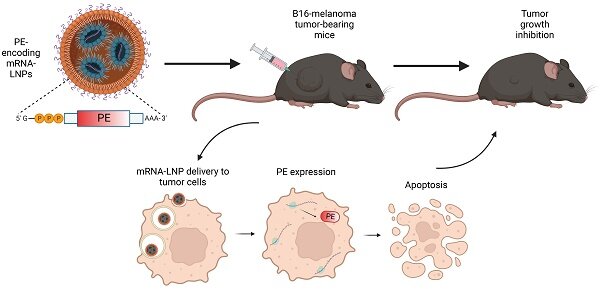
Tel Aviv University researchers have hit upon a novel method of cancer treatment by creating an mRNA ‘Trojan horse’ that instructed cancer cells to produce a toxin lethal to themselves, eventually killing them with a success rate of about 50%. This ground-breaking study was led by PhD student Yasmin Granot-Matok and Prof Dan Peer, a pioneer in the development of RNA therapeutics. The study’s results were published in Theranostics.
Prof Peer explains: “Many bacteria secrete toxins. The most famous of these is probably the botulinum toxin injected in Botox treatments. Another classic treatment technique is chemotherapy, involving the delivery of small molecules through the bloodstream to effectively kill cancer cells. However, chemotherapy has a major downside: it is not selective, and also kills healthy cells. Our idea was to deliver safe mRNA molecules encoded for a bacterial toxin directly to the cancer cells – inducing these cells to actually produce the toxic protein that would later kill them. It’s like placing a Trojan horse inside the cancer cell.”
First, the research team encoded the genetic info of the toxic protein produced by bacteria of the pseudomonas family into mRNA molecules (resembling the procedure in which genetic info of COVID-19’s ‘spike’ protein was encoded into mRNA molecules to create the vaccine). The mRNA molecules were then packaged in lipid nanoparticles developed in Prof Peer’s laboratory and coated with antibodies to ensure they would reach their target, the cancer cells. These particles were injected into the tumours of animal models with melanoma skin cancer. After a single injection, 44–60% of the cancer cells vanished.
“In our study, the cancer cell produced the toxic protein that eventually killed it,” says Prof Peer. “We used pseudomonas bacteria and the melanoma cancer, but this was only a matter of convenience. Many anaerobic bacteria, especially those that live in the ground, secrete toxins, and most of these toxins can probably be used with our method. This is our ‘recipe’, and we know how to deliver it directly to the target cells with our nanoparticles. When the cancer cell reads the ‘recipe’ at the other end it starts to produce the toxin as if it were the bacteria itself and this self-produced toxin eventually kills it. Thus, with a simple injection to the tumour bed, we can cause cancer cells to ‘commit suicide’, without damaging healthy cells. Moreover, cancer cells cannot develop resistance to our technology as often happens with chemotherapy – because we can always use a different natural toxin.”
Source: Tel Aviv University

